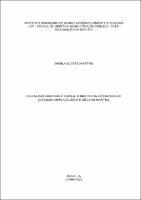Use este identificador para citar ou linkar para este item:
https://repositorio.idp.edu.br//handle/123456789/3469| Título: | Pluralismo jurídico e favela: o direito na literatura de Carolina Maria de Jesus e Geovani Martins |
| Autor(es): | Martins, Sâmila Duarte |
| Orientador(es): | Queiroz, Marcos Vinícius Lustosa |
| Palavras-chave: | Pluralismo jurídico;Favela;Literatura |
| Data de submissão: | 2022 |
| Editor: | IDP/ EAB |
| Citação: | MARTINS, Sâmila Duarte. Pluralismo jurídico e favela: o direito na literatura de Carolina Maria de Jesus e Geovani Martins. 2021. 68 f. Trabalho de Conclusão de Curso (Graduação em Direito) – Instituto Brasileiro de Ensino, Desenvolvimento e Pesquisa, Brasília, 2022. |
| Resumo: | A presente monografia analisa o fenômeno do pluralismo jurídico no Brasil por meio da
literatura de Carolina Maria de Jesus e Geovani Martins, no âmbito da periferia urbana - as
chamadas favelas. Pergunta-se como a literatura nacional nos faz repensar as formas de direito
aplicadas nos ambientes periféricos brasileiros. Para tanto, o primeiro capítulo concentra-se nas
questões teóricas sobre o surgimento do pluralismo jurídico, em oposição a cultura monista, e,
ainda, suas classificações. O segundo capítulo trata da formação das favelas brasileiras
paulistanas e cariocas, vividas, respectivamente, por Carolina e Geovani, bem como as faces da
criminalidade periférica e as regulações vigentes neste espaço. Por fim, o terceiro capítulo
analisa a partir das obras literárias Quarto de despejo: diário de uma favelada, de Carolina, e
O sol na cabeça, de Geovani, a presença na prática do pluralismo jurídico brasileiro, abordando
quatro temáticas em ambas as obras: i) características da favela; ii) percepção do Estado na
periferia; iii) contraste das dinâmicas sociais; e, iv) construções do pluralismo jurídico. Por fim,
este trabalho conclui que os novos regulamentos jurídicos são mostrados pela literatura a partir
da narração da vida de quem viveu e quem vive na favela. Nesse sentido, o Direito, que nada
mais é do que a regulação da própria realidade, vive entre as linhas escritas daqueles que o
experimentaram de forma atravessada, já que o ordenamento jurídico formal é seletivo no que
tange a aplicação normativa. Nessa predileção, calcada no distanciamento de realidades e
identificação legal, a sociedade “marginal” desenvolve sua própria juridicidade. A literatura
desmitifica a imagem do Estado e aproxima-o daqueles que diz lutar contra: os traficantes, na
medida em que usa os mesmos artifícios pautados no medo e na violência para destronar seu
inimigo. Nessa guerra, não há diferenciação entre aqueles que são “vilões” e aqueles que são
vítimas: os moradores da favela. Repensar o Direito a partir da literatura desenvolve habilidades
nos juristas e na sociedade que nos possibilitam sair da bolha formalista e tecnicista para
observar a realidade com mais cautela, crítica e empatia. Enxergar o outro dentro de sua
realidade e a partir do que ele vive nos ensina a buscar soluções jurídicas e sociais mais eficazes
e humanizadas. |
| Abstract: | This monograph analyzes the phenomenon of legal pluralism in Brazil through the literature of Carolina Maria de Jesus and Geovani Martins, within the urban periphery - the so-called favelas. It is asked how the national literature makes us rethink the forms of law applied in peripheral Brazilian environments. Therefore, the first chapter focuses on theoretical issues about the emergence of legal pluralism, as opposed to monist culture, and also its classifications. The second chapter deals with the formation of the Brazilian favelas in São Paulo and Rio de Janeiro, experienced, respectively, by Carolina and Geovani, as well as the faces of peripheral criminality and the regulations in force in this space. Finally, the third chapter analyzes the presence in the practice of Brazilian legal pluralism from the literary works Dump room: diary of a slum dweller, by Carolina, and The sun in the head, by Geovani, addressing four themes in both works: i) characteristics of the favela; ii) perception of the State in the periphery; iii) contrast of social dynamics; and, iv) constructions of legal pluralism. Finally, this work concludes that the new legal regulations are shown in the literature based on the narration of the lives of those who lived and those who live in the favela. In this sense, Law, which is nothing more than the regulation of reality itself, lives between the written lines of those who have experienced it in a crossed way, since the formal legal system is selective in terms of normative application. In this predilection, based on the distance from realities and legal identification, the “marginal” society develops its own legality. Literature demystifies the image of the State and brings it closer to those it claims to fight against: the traffickers, as it uses the same artifices based on fear and violence to dethrone its enemy. In this war, there is no differentiation between those who are “villains” and those who are victims: favela residents. Rethinking Law based on literature develops skills in jurists and society that enable us to get out of the formalist and technicist bubble to observe reality with more caution, criticism and empathy. Seeing the other within their reality and based on what they live teaches us to seek more effective and humane legal and social solutions. |
| URI: | https://repositorio.idp.edu.br//handle/123456789/3469 |
| Aparece nas coleções: | Trabalhos de Conclusão de Curso (Graduação) |
Arquivos associados a este item:
| Arquivo | Descrição | Tamanho | Formato | |
|---|---|---|---|---|
| Samila Duarte Martins.pdf | 908.11 kB | Adobe PDF |  Visualizar/Abrir |
Os itens no repositório estão protegidos por copyright, com todos os direitos reservados, salvo quando é indicado o contrário.
